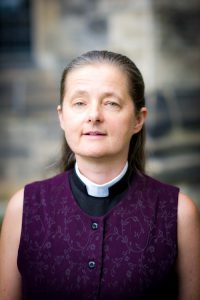The Rev’d Andrea Budgey, Humphrys Chaplain, answers our questions about this academic year, her advocacy work and more.
Trinity Magazine: What are you most looking forward to about the 2020-2021 academic year?
Andrea Budgey: This past summer has been a time of intense planning in the College (and in the church), and we’ve all been working in an atmosphere of abstraction. I’m really looking forward to having the energy and ingenuity of our students added to the equation, and seeing what emerges as we work on solutions together.
TM: The Trinity Chapel is an important space for the Trinity community, for music and spiritual worship. Is the Chapel open? How will those ongoing connection points continue during COVID-19?
AB: Chapel life is still work in progress. At the moment, we’re planning just one in-person service each week, the Faculty of Divinity’s Community Eucharist at 5:30 p.m. on Tuesdays (with other Divinity services happening online). Because of all the questions around singing and its role in spreading infection, we’re waiting to see whether we can start a modified version of Choral Evensong at some point later in the term. I’m hoping to be able to keep the Chapel open most of the day as a quiet refuge for prayer and meditation – the pews are marked for optimal spacing, and there’s a lot of hand sanitizer!
TM: Your advocacy in the area of social justice is well-known within the Trinity community and beyond. How has that been affected by the pandemic?
AB: Well, the diocesan Social Justice and Advocacy Committee has continued its work, and I’ve been very involved in that, especially in issues around homelessness during the pandemic. And I think we’ve all been wrestling with the question of anti-Black racism, and how to respond to it. The big difference for me has been that I made a commitment early on to cooking for the weekly homeless drop-in at Saint Stephen-in-the-Fields, and later to cooking and delivering meals in my own neighbourhood for the People’s Pantry initiative, so I’ve stayed away from rallies and demos so as not to compromise the safety of that work.
TM: In your experience as chaplain, what do you see as the most significant challenges facing Trinity students today? How can alumni help?
AB: There’s definitely going to be a sense of dislocation as a result of all the (extremely necessary) pandemic measures, with reduced opportunities for social gathering and exchange. Trinity has also made a very serious commitment to address questions of racism, privilege, and colonialism, and that conversation will challenge a lot of long-standing assumptions about who we are as a community. I think the most important thing alumni can do is to embrace the possibility of transformation, and join with staff and students in trying to imagine and bring about the best and most equitable future for the College.
TM: What role can the chaplaincy play for members of the Trinity community who are feeling disconnected from others staying safe at home?
AB: This is a tricky one! I think a lot of students are reluctant to make official arrangements to “talk to the chaplain,” so I have a lot of conversations that start with “Hey, do you have a few minutes?” and finish a couple of hours later. There’s going to be a lot less opportunity for those sorts of encounters this year, so I’m going to make a real effort to let students know that I’m available by phone, e-mail, social media, or videoconferencing platforms, including evenings and weekends, if they need to talk to someone outside the academic structure about personal, spiritual, or existential concerns—and I’m counting on my colleagues to help get that word out.


Sorry, comments are closed for this post.